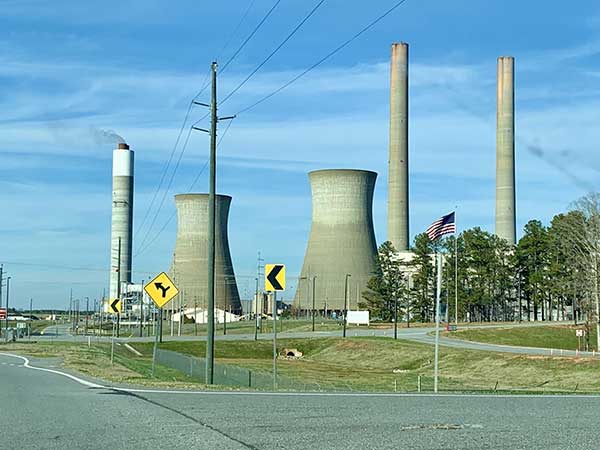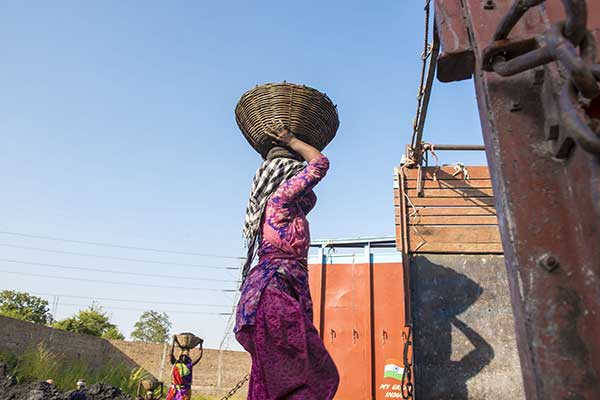The Biden administration is being urged to follow through on its commitment to prioritize environmental justice in the energy transition, which a draft report suggests cannot be achieved with the administration’s current focus on carbon capture technologies. Also, this week, policy experts warn that the cyberattack on the Colonial Pipeline is a clear indication of the vulnerability of the nation’s energy infrastructure and the need to take proactive measures to secure it.
White House Advisory Council Against Nuclear, Carbon Capture
The White House Environmental Justice Advisory Council has drafted a report urging the Biden administration to rethink its support for carbon capture technologies and nuclear energy in the drive toward net zero.
The council said proposed investments in carbon capture, carbon markets, bioenergy, and nuclear power were not in harmony with the Biden administration’s stated desire to have 40% of clean energy and climate investments benefit poorer and marginalized communities.
President Joe Biden has said that he wants his climate agenda to be rolled out with a particular concern for environmental justice, though he hasn’t provided details on how he will do that.
The Biden administration is keen on supporting technologies for carbon capture and removal and is also considering providing subsidies to keep nuclear power plants in service. His administration’s support for such technologies is in line with the International Energy Agency’s recent report that urges investment in the technology to achieve climate goals.
While discouraging such investments because they may potentially harm marginalized communities, the White House advisory council outlines concrete steps the Biden administration should take to achieve environmental justice in the energy transition. Among such steps are consultations with underprivileged communities along with investments in capacity building and technical assistance for them.
Lessons to Be Learned From Attack on Colonial Pipeline
The cyberattack on the Colonial Pipeline in May 2021 is part of a trend where energy infrastructure is increasingly the focus of cybersecurity threats.
In 2020, the energy sector was among the most frequently targeted by hackers, with only the finance and manufacturing sectors experiencing more threats.
Regulators are concerned and believe the cybersecurity standards currently enforced for the electricity sector should likewise be made mandatory for the oil and gas industry. Currently, cybersecurity standards for the fossil fuel industry are implemented on a voluntary basis.
However, experts say both the electricity sector and the oil and gas pipeline sector face cybersecurity threats as they rely on increasingly sophisticated software, and the complexity may make them more vulnerable. The operators of energy companies may also be reluctant to shut off the energy they supply in order to install frequent security patches.
A decarbonized energy system may increase the potential for cybersecurity risks since such systems will rely more heavily on electricity, digitalization, and interconnected systems such as smart grids and the Internet of Things.
The International Energy Agency has pointed out that in the future, if electric vehicles were the primary mode of transportation, the dangers posed by cyberattacks could have epic economic and social consequences.
One option for increasing the resilience of the energy infrastructure is through interdependence. During the Texas power failure in February, those parts of the Texas power supply that were connected to grids in other states coped better with the winter storm than did the grids that operated in isolation.
Likewise, the New York region experienced less disruption from the Colonial Pipeline because of its access to a diversified set of port facilities, storage tanks, and fuel pipelines. Of course, such redundancies come at a cost, and there is some question as to how much people would be willing to pay to ensure security against events that are not everyday occurrences.
Previous studies by the U.S. Energy Department on whether to build strategic fuel reserves to protect against disruptions were shelved because it was difficult to perform cost-benefit analyses in the face of numerous uncertainties about future possible events.
Asian Development Bank Will Stop Financing Coal
The Asian Development Bank (ADB) has released a draft energy policy stating it will no longer finance coal mining, or oil and natural gas field exploration, drilling, and extraction.
The bank, which provides project financing for the poorest countries in the Asia-Pacific region, said it was making the shift because fossil fuels harm the environment and accelerate climate change. Whereas the fuels have helped with the region’s development, the bank says the use of them has not solved the ongoing problem related to access to energy.
The draft also stated that under certain conditions the bank may still, however, finance natural gas projects or hybrid energy projects involving the use of fossil fuels as a backup.
The ADB has given more than $40 billion in the past decade to finance energy projects in the region and more than 80% of the growth in demand for coal in the coming year is expected to come from Asia.
In keeping with its desire to move away from fossil fuels, the bank has set a target of providing $80 billion in climate financing between 2019 and 2030 and hopes that 75% of the projects it finances will contribute to tackling climate change.
Though pleased by the bank’s decision, environmental activists are urging the bank to cease funding natural gas as well.
They also say the bank bears responsibility for some of the harm caused by the myriad of coal mines it financed in the Philippines and India that led to increased air pollution and environmental degradation.
The ADB has already invested several million dollars in solar projects in India. It has promised to fund smaller projects as well in rural electrification, clean cooking, and energy efficiency.
Appeals Court Allows Pipeline Construction in Maine to Resume
The U.S. Circuit Court of Appeals has ruled in favor of construction of a segment of the pipeline that will bring hydropower from Canada to the New England grid, following challenges to its route through 53 miles of forest.
Opponents had asked the court to stop construction of the pipeline through the forest until the Army Corps of Engineers had conducted a more rigorous environmental impact statement of the New England Clean Energy Connect (NECEC) project.
However, the court ruled against them because it said there was little evidence that another environmental study would yield different conclusions. The Army Corps had earlier given approval for the project, as had the Maine Department of Environmental Protection.
New England Clean Energy Connect’s management hailed the court ruling as a victory for clean energy in Maine. The 145-mile hydropower pipeline will run from Canada to connect with the grid in Maine bringing as much as 1,200 megawatts of power.
Supporters said the project will eliminate 3 million metric tons of greenhouse gas emissions annually from the grid, stabilize energy costs, and provide good-quality jobs. However, its opponents say the benefits have been overstated, and it will harm forestry.
Opponents of the NECEC project said that the ruling is not the final word on the project since a referendum will be held on the issue in November.
Spain Passes Bill for Carbon Neutrality
Spain has passed the Climate Change and Energy Transition Act in which it commits to reduce emissions by 23% relative to 1990 levels by the year 2030. The bill also stipulates that by 2030 74% of the country’s electricity production must come from renewable energy sources.
Further, the bill requires that all towns with a population of more than 50,000 must be low-emission zones. Spain is seeking to comply with the EU’s target of a 40% reduction in emissions relative to 1990 by the year 2030.
However, the right-wing and conservative lawmakers were not in favor of the bill.
Spain’s largest oil company, Repsol, is seeking to become net zero and recently established two wind farms in the country’s northeast. The country has also installed more than 7 gigawatts of solar capacity within the past two years.
The Spanish government emphasized the importance of the transition to the country, saying that every year Spain experiences about 700 deaths and the loss of 900 million euros due to extreme weather events.
Lamborghini Reveals Plans for EVs
High-end Italian car marker Lamborghini has revealed plans to transition to electric vehicles in a phased process that will see it move first to hybrid vehicles then to fully electric ones before 2030.
The company, which is owned by Germany’s Volkswagen, said it wanted to ensure sustainability while remaining true to the qualities for which the Lamborghini is known. To maintain the special driving experience, the company’s engineers will develop new technologies. The company will also use lightweight carbon fiber materials to manufacture the car to compensate for the extra weight that electrification brings.
The transition will involve an investment of 1.5 billion euros over four years, the largest in the company’s history.
Other European luxury cars have already begun production of electric vehicles, including BMW and Audi. The German company that makes the Mercedes-Benz says it will be launching an electric vehicle next year.
Opinion writer: Jewel Fraser
The opinions, beliefs, and viewpoints expressed by the various authors do not necessarily reflect the opinions, beliefs, or viewpoints of Interactive Energy Group, LLC (IEG) or its parent companies or affiliates and may have been created by a third party contracted by IEG. Any content provided by the bloggers or authors are of their opinion and are not intended to malign any individual, organization, company, group, or anyone or anything.
Brought to you by energysavings.com
All images licensed from Adobe Stock.
Featured image:



